Introduction to Management: Functions, Business Structure, HR and Talent Management
VerifiedAdded on 2023/06/15
|10
|2615
|376
AI Summary
This assessment provides in-depth knowledge and insights of management process and its impact on an organisation's functioning. It covers management structure, business functions, marketing function, HR and talent management, and organisation culture.
Contribute Materials
Your contribution can guide someone’s learning journey. Share your
documents today.
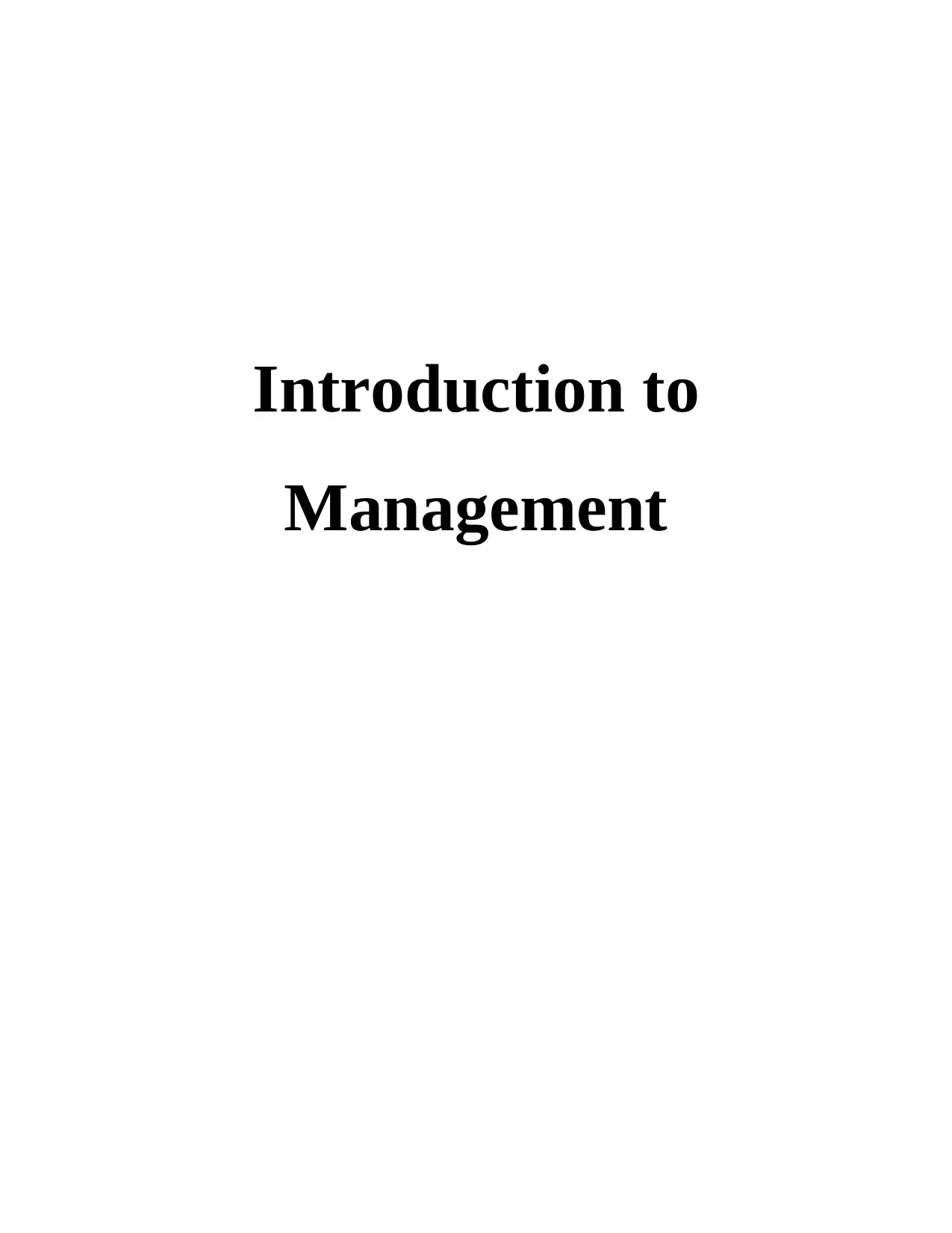
Introduction to
Management
Management
Secure Best Marks with AI Grader
Need help grading? Try our AI Grader for instant feedback on your assignments.
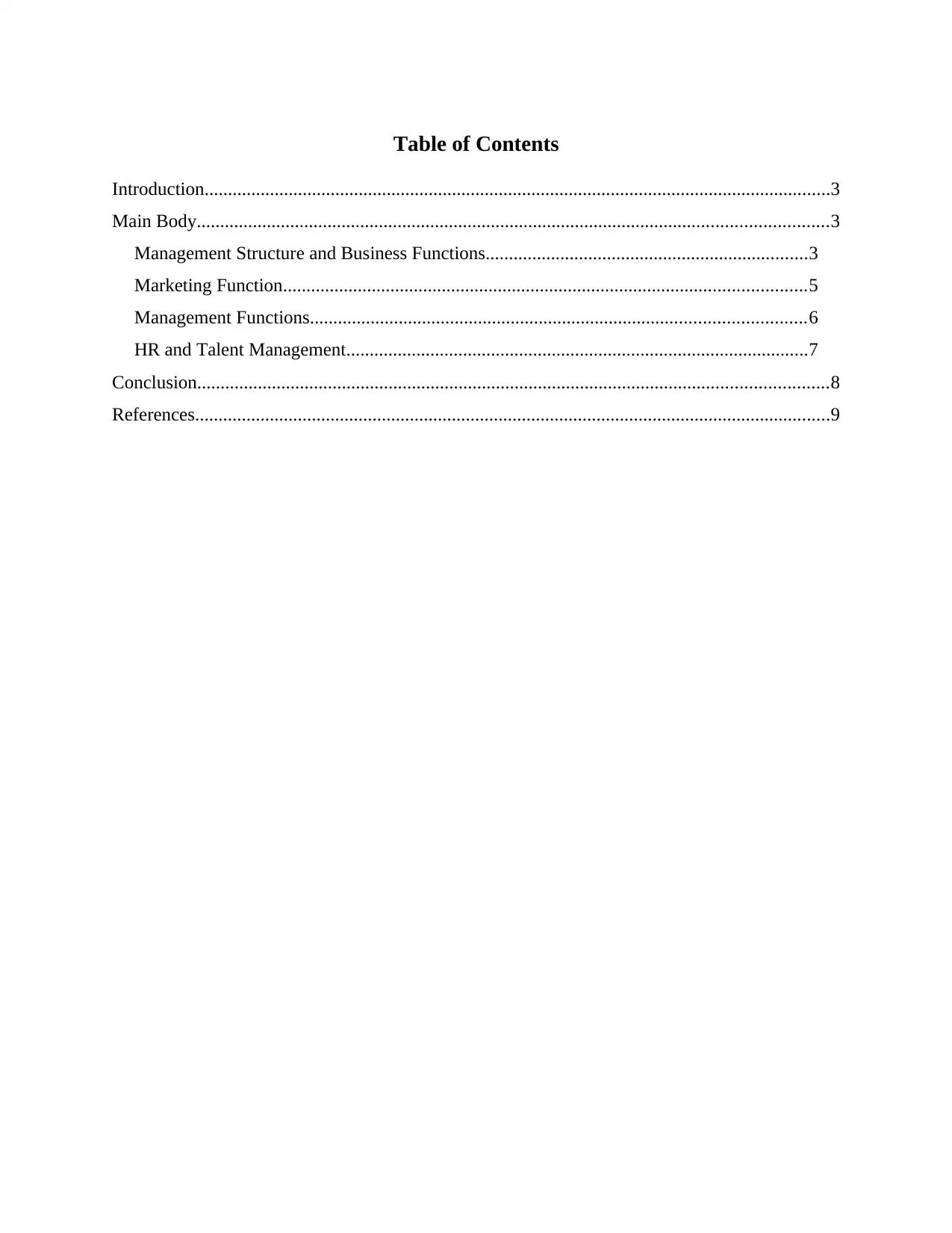
Table of Contents
Introduction......................................................................................................................................3
Main Body.......................................................................................................................................3
Management Structure and Business Functions.....................................................................3
Marketing Function................................................................................................................5
Management Functions..........................................................................................................6
HR and Talent Management...................................................................................................7
Conclusion.......................................................................................................................................8
References........................................................................................................................................9
Introduction......................................................................................................................................3
Main Body.......................................................................................................................................3
Management Structure and Business Functions.....................................................................3
Marketing Function................................................................................................................5
Management Functions..........................................................................................................6
HR and Talent Management...................................................................................................7
Conclusion.......................................................................................................................................8
References........................................................................................................................................9
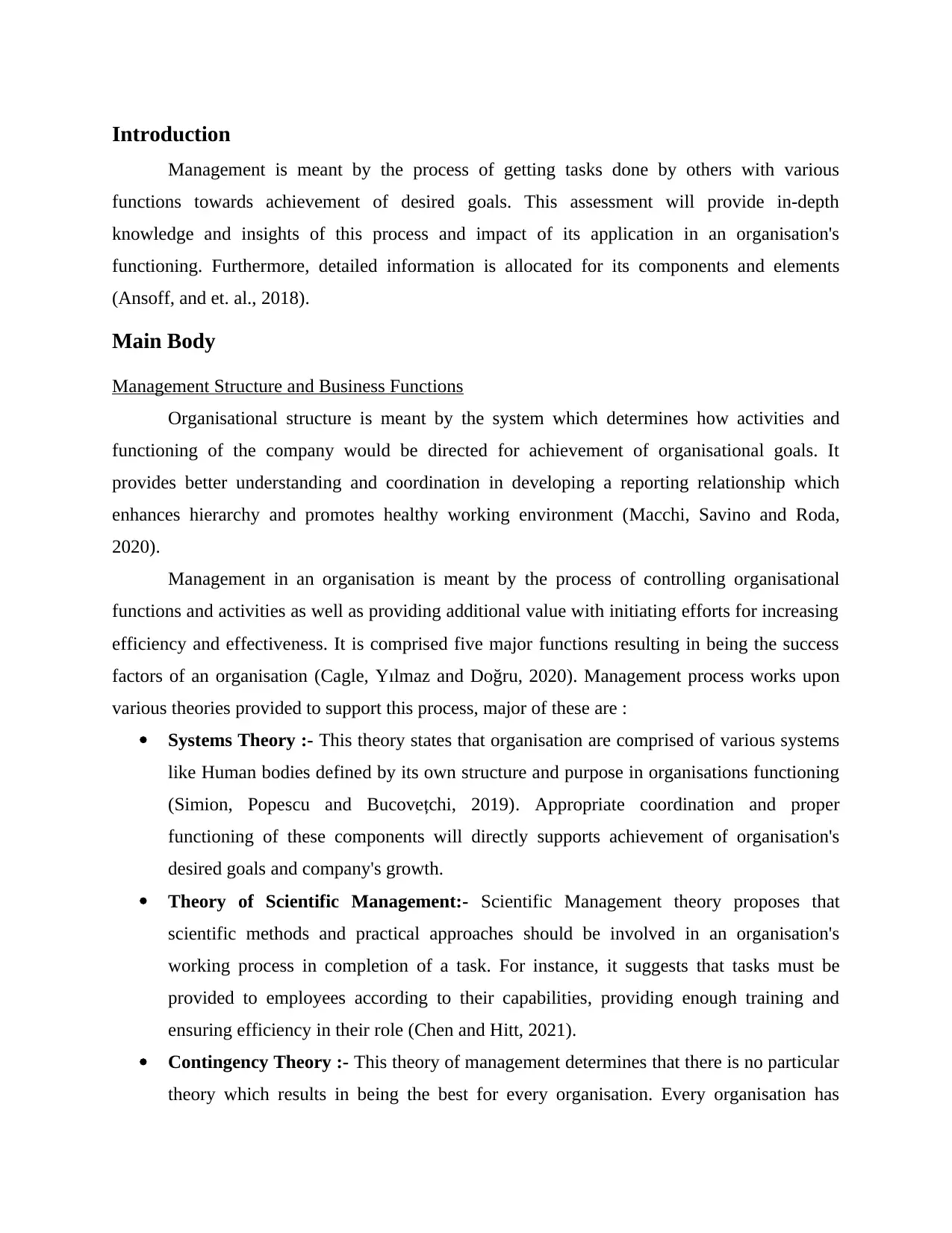
Introduction
Management is meant by the process of getting tasks done by others with various
functions towards achievement of desired goals. This assessment will provide in-depth
knowledge and insights of this process and impact of its application in an organisation's
functioning. Furthermore, detailed information is allocated for its components and elements
(Ansoff, and et. al., 2018).
Main Body
Management Structure and Business Functions
Organisational structure is meant by the system which determines how activities and
functioning of the company would be directed for achievement of organisational goals. It
provides better understanding and coordination in developing a reporting relationship which
enhances hierarchy and promotes healthy working environment (Macchi, Savino and Roda,
2020).
Management in an organisation is meant by the process of controlling organisational
functions and activities as well as providing additional value with initiating efforts for increasing
efficiency and effectiveness. It is comprised five major functions resulting in being the success
factors of an organisation (Cagle, Yılmaz and Doğru, 2020). Management process works upon
various theories provided to support this process, major of these are :
Systems Theory :- This theory states that organisation are comprised of various systems
like Human bodies defined by its own structure and purpose in organisations functioning
(Simion, Popescu and Bucovețchi, 2019). Appropriate coordination and proper
functioning of these components will directly supports achievement of organisation's
desired goals and company's growth.
Theory of Scientific Management:- Scientific Management theory proposes that
scientific methods and practical approaches should be involved in an organisation's
working process in completion of a task. For instance, it suggests that tasks must be
provided to employees according to their capabilities, providing enough training and
ensuring efficiency in their role (Chen and Hitt, 2021).
Contingency Theory :- This theory of management determines that there is no particular
theory which results in being the best for every organisation. Every organisation has
Management is meant by the process of getting tasks done by others with various
functions towards achievement of desired goals. This assessment will provide in-depth
knowledge and insights of this process and impact of its application in an organisation's
functioning. Furthermore, detailed information is allocated for its components and elements
(Ansoff, and et. al., 2018).
Main Body
Management Structure and Business Functions
Organisational structure is meant by the system which determines how activities and
functioning of the company would be directed for achievement of organisational goals. It
provides better understanding and coordination in developing a reporting relationship which
enhances hierarchy and promotes healthy working environment (Macchi, Savino and Roda,
2020).
Management in an organisation is meant by the process of controlling organisational
functions and activities as well as providing additional value with initiating efforts for increasing
efficiency and effectiveness. It is comprised five major functions resulting in being the success
factors of an organisation (Cagle, Yılmaz and Doğru, 2020). Management process works upon
various theories provided to support this process, major of these are :
Systems Theory :- This theory states that organisation are comprised of various systems
like Human bodies defined by its own structure and purpose in organisations functioning
(Simion, Popescu and Bucovețchi, 2019). Appropriate coordination and proper
functioning of these components will directly supports achievement of organisation's
desired goals and company's growth.
Theory of Scientific Management:- Scientific Management theory proposes that
scientific methods and practical approaches should be involved in an organisation's
working process in completion of a task. For instance, it suggests that tasks must be
provided to employees according to their capabilities, providing enough training and
ensuring efficiency in their role (Chen and Hitt, 2021).
Contingency Theory :- This theory of management determines that there is no particular
theory which results in being the best for every organisation. Every organisation has
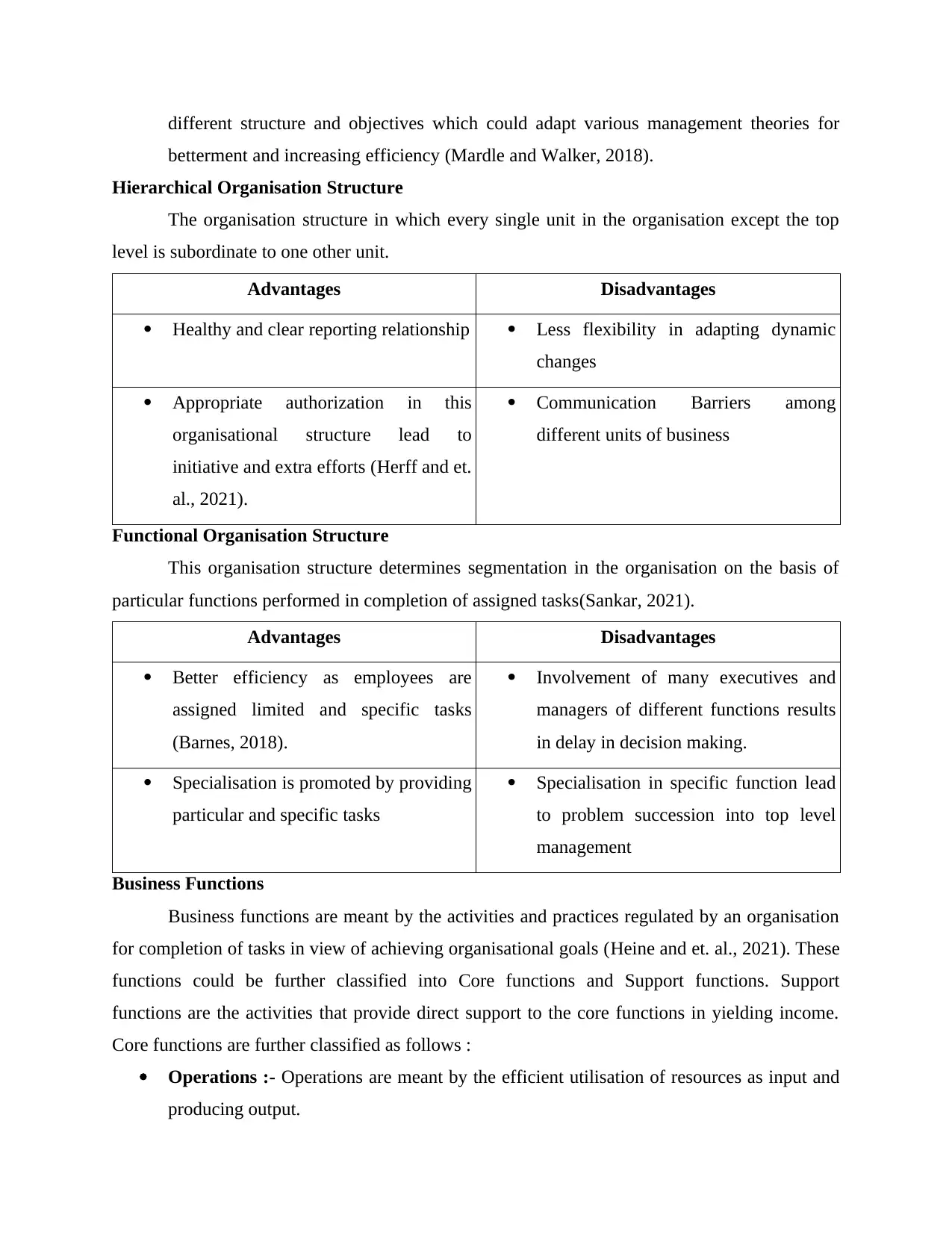
different structure and objectives which could adapt various management theories for
betterment and increasing efficiency (Mardle and Walker, 2018).
Hierarchical Organisation Structure
The organisation structure in which every single unit in the organisation except the top
level is subordinate to one other unit.
Advantages Disadvantages
Healthy and clear reporting relationship Less flexibility in adapting dynamic
changes
Appropriate authorization in this
organisational structure lead to
initiative and extra efforts (Herff and et.
al., 2021).
Communication Barriers among
different units of business
Functional Organisation Structure
This organisation structure determines segmentation in the organisation on the basis of
particular functions performed in completion of assigned tasks(Sankar, 2021).
Advantages Disadvantages
Better efficiency as employees are
assigned limited and specific tasks
(Barnes, 2018).
Involvement of many executives and
managers of different functions results
in delay in decision making.
Specialisation is promoted by providing
particular and specific tasks
Specialisation in specific function lead
to problem succession into top level
management
Business Functions
Business functions are meant by the activities and practices regulated by an organisation
for completion of tasks in view of achieving organisational goals (Heine and et. al., 2021). These
functions could be further classified into Core functions and Support functions. Support
functions are the activities that provide direct support to the core functions in yielding income.
Core functions are further classified as follows :
Operations :- Operations are meant by the efficient utilisation of resources as input and
producing output.
betterment and increasing efficiency (Mardle and Walker, 2018).
Hierarchical Organisation Structure
The organisation structure in which every single unit in the organisation except the top
level is subordinate to one other unit.
Advantages Disadvantages
Healthy and clear reporting relationship Less flexibility in adapting dynamic
changes
Appropriate authorization in this
organisational structure lead to
initiative and extra efforts (Herff and et.
al., 2021).
Communication Barriers among
different units of business
Functional Organisation Structure
This organisation structure determines segmentation in the organisation on the basis of
particular functions performed in completion of assigned tasks(Sankar, 2021).
Advantages Disadvantages
Better efficiency as employees are
assigned limited and specific tasks
(Barnes, 2018).
Involvement of many executives and
managers of different functions results
in delay in decision making.
Specialisation is promoted by providing
particular and specific tasks
Specialisation in specific function lead
to problem succession into top level
management
Business Functions
Business functions are meant by the activities and practices regulated by an organisation
for completion of tasks in view of achieving organisational goals (Heine and et. al., 2021). These
functions could be further classified into Core functions and Support functions. Support
functions are the activities that provide direct support to the core functions in yielding income.
Core functions are further classified as follows :
Operations :- Operations are meant by the efficient utilisation of resources as input and
producing output.
Secure Best Marks with AI Grader
Need help grading? Try our AI Grader for instant feedback on your assignments.
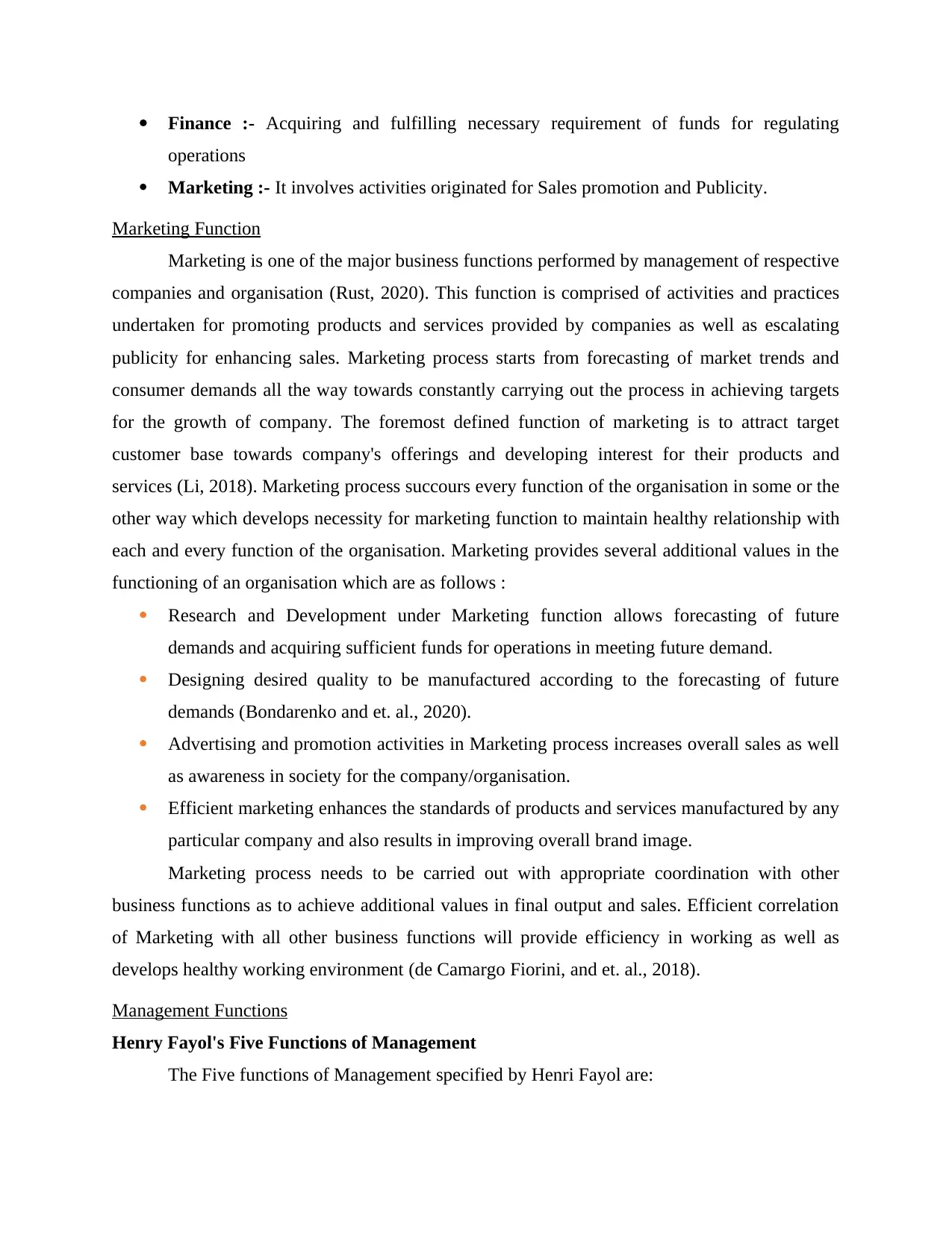
Finance :- Acquiring and fulfilling necessary requirement of funds for regulating
operations
Marketing :- It involves activities originated for Sales promotion and Publicity.
Marketing Function
Marketing is one of the major business functions performed by management of respective
companies and organisation (Rust, 2020). This function is comprised of activities and practices
undertaken for promoting products and services provided by companies as well as escalating
publicity for enhancing sales. Marketing process starts from forecasting of market trends and
consumer demands all the way towards constantly carrying out the process in achieving targets
for the growth of company. The foremost defined function of marketing is to attract target
customer base towards company's offerings and developing interest for their products and
services (Li, 2018). Marketing process succours every function of the organisation in some or the
other way which develops necessity for marketing function to maintain healthy relationship with
each and every function of the organisation. Marketing provides several additional values in the
functioning of an organisation which are as follows :
Research and Development under Marketing function allows forecasting of future
demands and acquiring sufficient funds for operations in meeting future demand.
Designing desired quality to be manufactured according to the forecasting of future
demands (Bondarenko and et. al., 2020).
Advertising and promotion activities in Marketing process increases overall sales as well
as awareness in society for the company/organisation.
Efficient marketing enhances the standards of products and services manufactured by any
particular company and also results in improving overall brand image.
Marketing process needs to be carried out with appropriate coordination with other
business functions as to achieve additional values in final output and sales. Efficient correlation
of Marketing with all other business functions will provide efficiency in working as well as
develops healthy working environment (de Camargo Fiorini, and et. al., 2018).
Management Functions
Henry Fayol's Five Functions of Management
The Five functions of Management specified by Henri Fayol are:
operations
Marketing :- It involves activities originated for Sales promotion and Publicity.
Marketing Function
Marketing is one of the major business functions performed by management of respective
companies and organisation (Rust, 2020). This function is comprised of activities and practices
undertaken for promoting products and services provided by companies as well as escalating
publicity for enhancing sales. Marketing process starts from forecasting of market trends and
consumer demands all the way towards constantly carrying out the process in achieving targets
for the growth of company. The foremost defined function of marketing is to attract target
customer base towards company's offerings and developing interest for their products and
services (Li, 2018). Marketing process succours every function of the organisation in some or the
other way which develops necessity for marketing function to maintain healthy relationship with
each and every function of the organisation. Marketing provides several additional values in the
functioning of an organisation which are as follows :
Research and Development under Marketing function allows forecasting of future
demands and acquiring sufficient funds for operations in meeting future demand.
Designing desired quality to be manufactured according to the forecasting of future
demands (Bondarenko and et. al., 2020).
Advertising and promotion activities in Marketing process increases overall sales as well
as awareness in society for the company/organisation.
Efficient marketing enhances the standards of products and services manufactured by any
particular company and also results in improving overall brand image.
Marketing process needs to be carried out with appropriate coordination with other
business functions as to achieve additional values in final output and sales. Efficient correlation
of Marketing with all other business functions will provide efficiency in working as well as
develops healthy working environment (de Camargo Fiorini, and et. al., 2018).
Management Functions
Henry Fayol's Five Functions of Management
The Five functions of Management specified by Henri Fayol are:
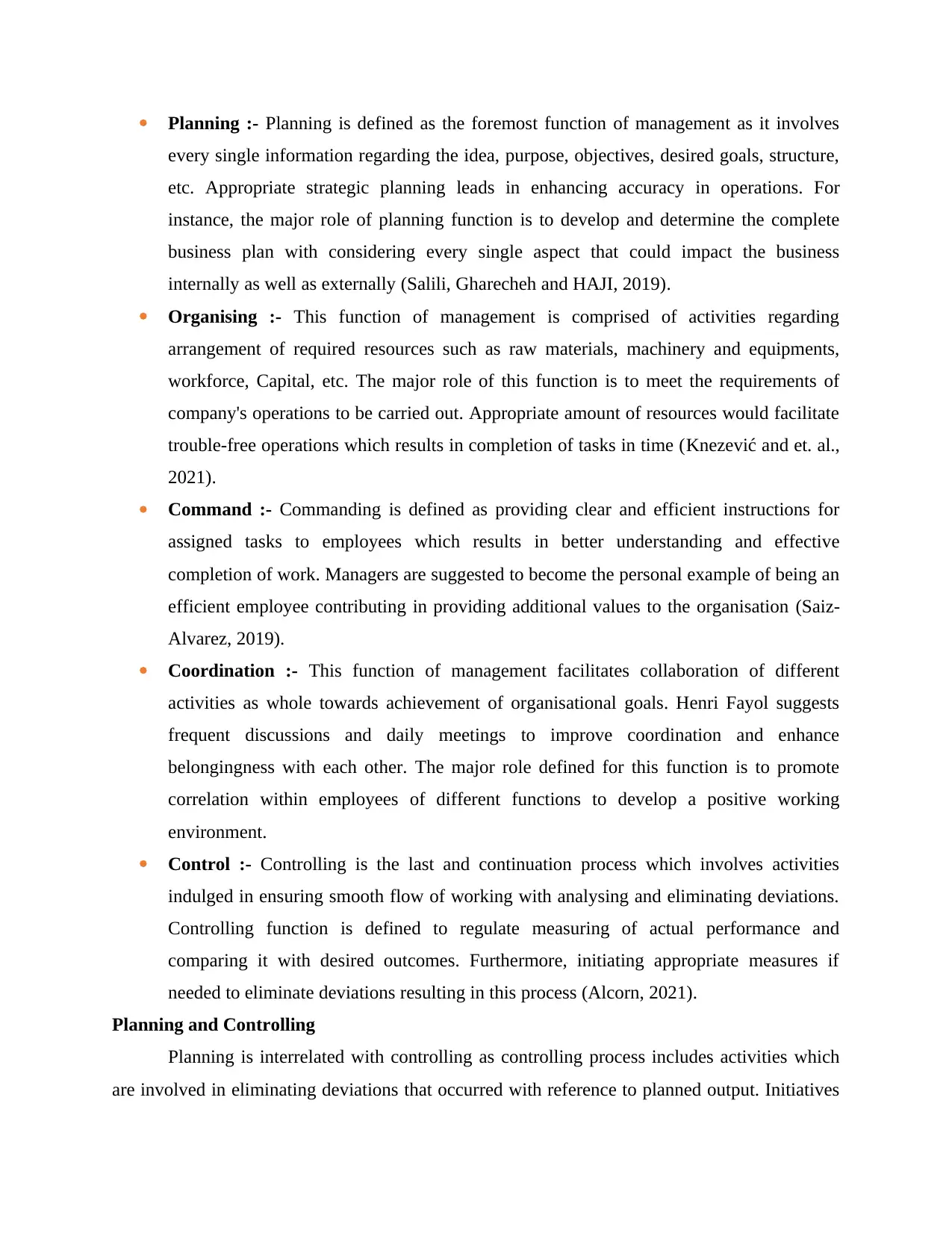
Planning :- Planning is defined as the foremost function of management as it involves
every single information regarding the idea, purpose, objectives, desired goals, structure,
etc. Appropriate strategic planning leads in enhancing accuracy in operations. For
instance, the major role of planning function is to develop and determine the complete
business plan with considering every single aspect that could impact the business
internally as well as externally (Salili, Gharecheh and HAJI, 2019).
Organising :- This function of management is comprised of activities regarding
arrangement of required resources such as raw materials, machinery and equipments,
workforce, Capital, etc. The major role of this function is to meet the requirements of
company's operations to be carried out. Appropriate amount of resources would facilitate
trouble-free operations which results in completion of tasks in time (Knezević and et. al.,
2021).
Command :- Commanding is defined as providing clear and efficient instructions for
assigned tasks to employees which results in better understanding and effective
completion of work. Managers are suggested to become the personal example of being an
efficient employee contributing in providing additional values to the organisation (Saiz-
Alvarez, 2019).
Coordination :- This function of management facilitates collaboration of different
activities as whole towards achievement of organisational goals. Henri Fayol suggests
frequent discussions and daily meetings to improve coordination and enhance
belongingness with each other. The major role defined for this function is to promote
correlation within employees of different functions to develop a positive working
environment.
Control :- Controlling is the last and continuation process which involves activities
indulged in ensuring smooth flow of working with analysing and eliminating deviations.
Controlling function is defined to regulate measuring of actual performance and
comparing it with desired outcomes. Furthermore, initiating appropriate measures if
needed to eliminate deviations resulting in this process (Alcorn, 2021).
Planning and Controlling
Planning is interrelated with controlling as controlling process includes activities which
are involved in eliminating deviations that occurred with reference to planned output. Initiatives
every single information regarding the idea, purpose, objectives, desired goals, structure,
etc. Appropriate strategic planning leads in enhancing accuracy in operations. For
instance, the major role of planning function is to develop and determine the complete
business plan with considering every single aspect that could impact the business
internally as well as externally (Salili, Gharecheh and HAJI, 2019).
Organising :- This function of management is comprised of activities regarding
arrangement of required resources such as raw materials, machinery and equipments,
workforce, Capital, etc. The major role of this function is to meet the requirements of
company's operations to be carried out. Appropriate amount of resources would facilitate
trouble-free operations which results in completion of tasks in time (Knezević and et. al.,
2021).
Command :- Commanding is defined as providing clear and efficient instructions for
assigned tasks to employees which results in better understanding and effective
completion of work. Managers are suggested to become the personal example of being an
efficient employee contributing in providing additional values to the organisation (Saiz-
Alvarez, 2019).
Coordination :- This function of management facilitates collaboration of different
activities as whole towards achievement of organisational goals. Henri Fayol suggests
frequent discussions and daily meetings to improve coordination and enhance
belongingness with each other. The major role defined for this function is to promote
correlation within employees of different functions to develop a positive working
environment.
Control :- Controlling is the last and continuation process which involves activities
indulged in ensuring smooth flow of working with analysing and eliminating deviations.
Controlling function is defined to regulate measuring of actual performance and
comparing it with desired outcomes. Furthermore, initiating appropriate measures if
needed to eliminate deviations resulting in this process (Alcorn, 2021).
Planning and Controlling
Planning is interrelated with controlling as controlling process includes activities which
are involved in eliminating deviations that occurred with reference to planned output. Initiatives
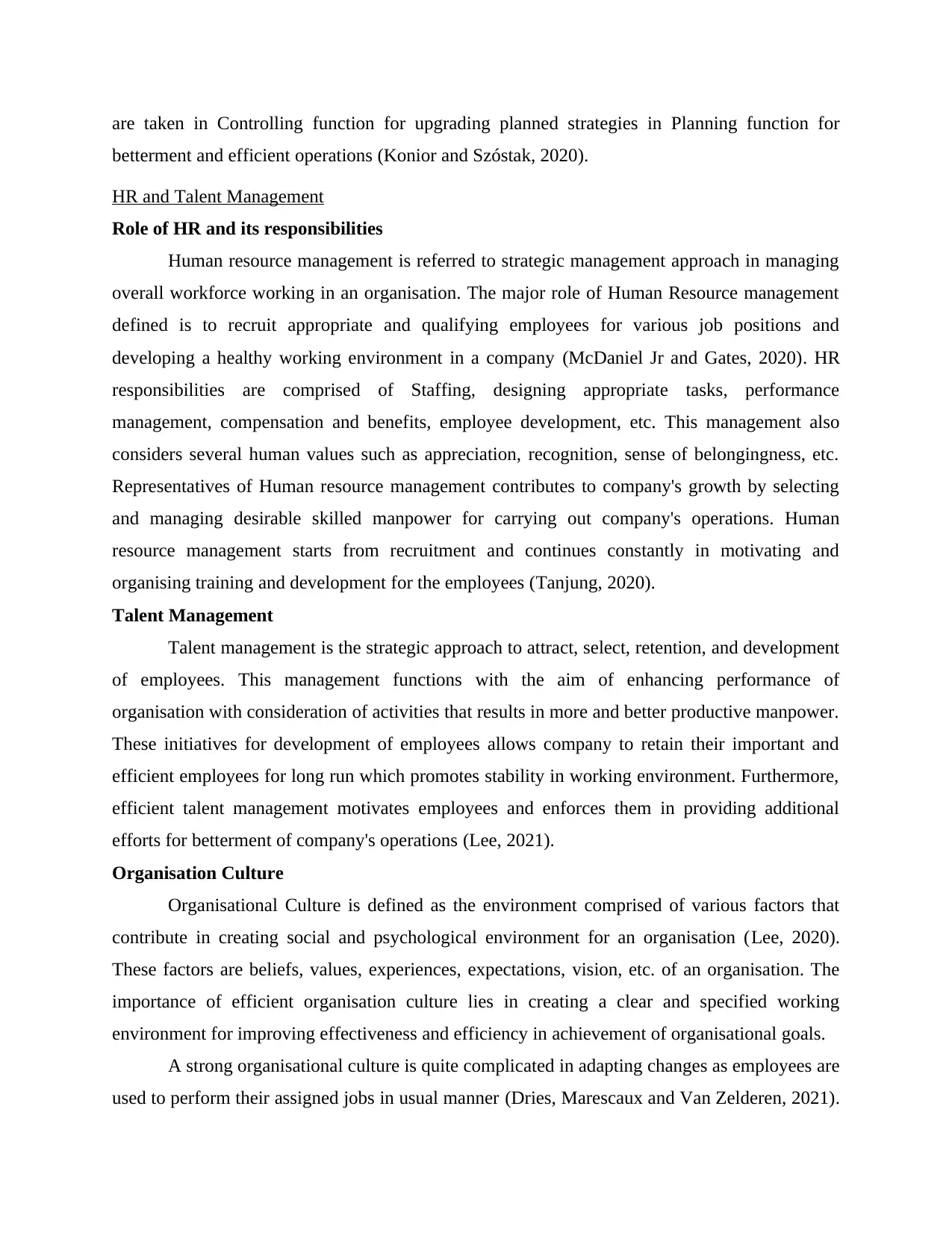
are taken in Controlling function for upgrading planned strategies in Planning function for
betterment and efficient operations (Konior and Szóstak, 2020).
HR and Talent Management
Role of HR and its responsibilities
Human resource management is referred to strategic management approach in managing
overall workforce working in an organisation. The major role of Human Resource management
defined is to recruit appropriate and qualifying employees for various job positions and
developing a healthy working environment in a company (McDaniel Jr and Gates, 2020). HR
responsibilities are comprised of Staffing, designing appropriate tasks, performance
management, compensation and benefits, employee development, etc. This management also
considers several human values such as appreciation, recognition, sense of belongingness, etc.
Representatives of Human resource management contributes to company's growth by selecting
and managing desirable skilled manpower for carrying out company's operations. Human
resource management starts from recruitment and continues constantly in motivating and
organising training and development for the employees (Tanjung, 2020).
Talent Management
Talent management is the strategic approach to attract, select, retention, and development
of employees. This management functions with the aim of enhancing performance of
organisation with consideration of activities that results in more and better productive manpower.
These initiatives for development of employees allows company to retain their important and
efficient employees for long run which promotes stability in working environment. Furthermore,
efficient talent management motivates employees and enforces them in providing additional
efforts for betterment of company's operations (Lee, 2021).
Organisation Culture
Organisational Culture is defined as the environment comprised of various factors that
contribute in creating social and psychological environment for an organisation (Lee, 2020).
These factors are beliefs, values, experiences, expectations, vision, etc. of an organisation. The
importance of efficient organisation culture lies in creating a clear and specified working
environment for improving effectiveness and efficiency in achievement of organisational goals.
A strong organisational culture is quite complicated in adapting changes as employees are
used to perform their assigned jobs in usual manner (Dries, Marescaux and Van Zelderen, 2021).
betterment and efficient operations (Konior and Szóstak, 2020).
HR and Talent Management
Role of HR and its responsibilities
Human resource management is referred to strategic management approach in managing
overall workforce working in an organisation. The major role of Human Resource management
defined is to recruit appropriate and qualifying employees for various job positions and
developing a healthy working environment in a company (McDaniel Jr and Gates, 2020). HR
responsibilities are comprised of Staffing, designing appropriate tasks, performance
management, compensation and benefits, employee development, etc. This management also
considers several human values such as appreciation, recognition, sense of belongingness, etc.
Representatives of Human resource management contributes to company's growth by selecting
and managing desirable skilled manpower for carrying out company's operations. Human
resource management starts from recruitment and continues constantly in motivating and
organising training and development for the employees (Tanjung, 2020).
Talent Management
Talent management is the strategic approach to attract, select, retention, and development
of employees. This management functions with the aim of enhancing performance of
organisation with consideration of activities that results in more and better productive manpower.
These initiatives for development of employees allows company to retain their important and
efficient employees for long run which promotes stability in working environment. Furthermore,
efficient talent management motivates employees and enforces them in providing additional
efforts for betterment of company's operations (Lee, 2021).
Organisation Culture
Organisational Culture is defined as the environment comprised of various factors that
contribute in creating social and psychological environment for an organisation (Lee, 2020).
These factors are beliefs, values, experiences, expectations, vision, etc. of an organisation. The
importance of efficient organisation culture lies in creating a clear and specified working
environment for improving effectiveness and efficiency in achievement of organisational goals.
A strong organisational culture is quite complicated in adapting changes as employees are
used to perform their assigned jobs in usual manner (Dries, Marescaux and Van Zelderen, 2021).
Paraphrase This Document
Need a fresh take? Get an instant paraphrase of this document with our AI Paraphraser
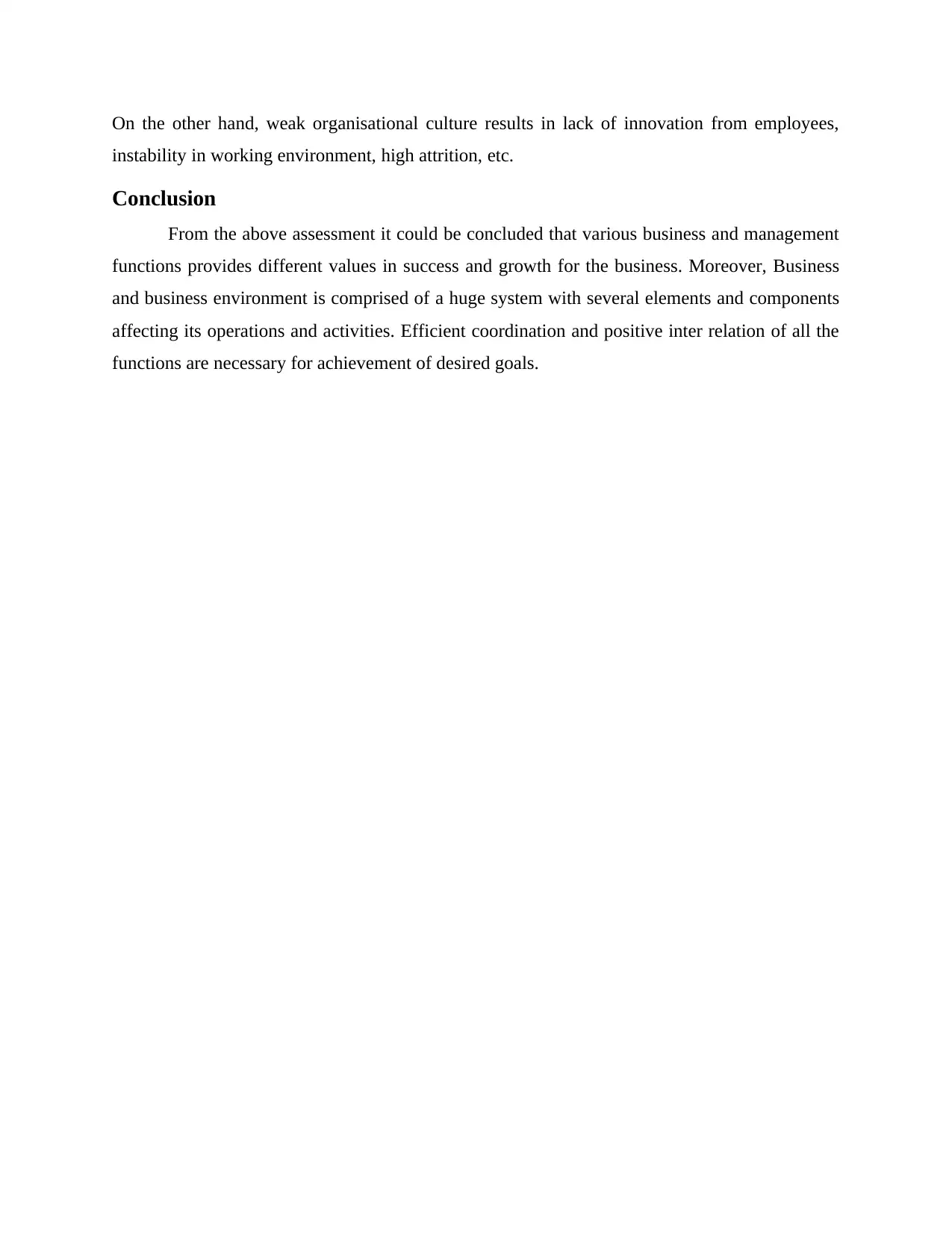
On the other hand, weak organisational culture results in lack of innovation from employees,
instability in working environment, high attrition, etc.
Conclusion
From the above assessment it could be concluded that various business and management
functions provides different values in success and growth for the business. Moreover, Business
and business environment is comprised of a huge system with several elements and components
affecting its operations and activities. Efficient coordination and positive inter relation of all the
functions are necessary for achievement of desired goals.
instability in working environment, high attrition, etc.
Conclusion
From the above assessment it could be concluded that various business and management
functions provides different values in success and growth for the business. Moreover, Business
and business environment is comprised of a huge system with several elements and components
affecting its operations and activities. Efficient coordination and positive inter relation of all the
functions are necessary for achievement of desired goals.
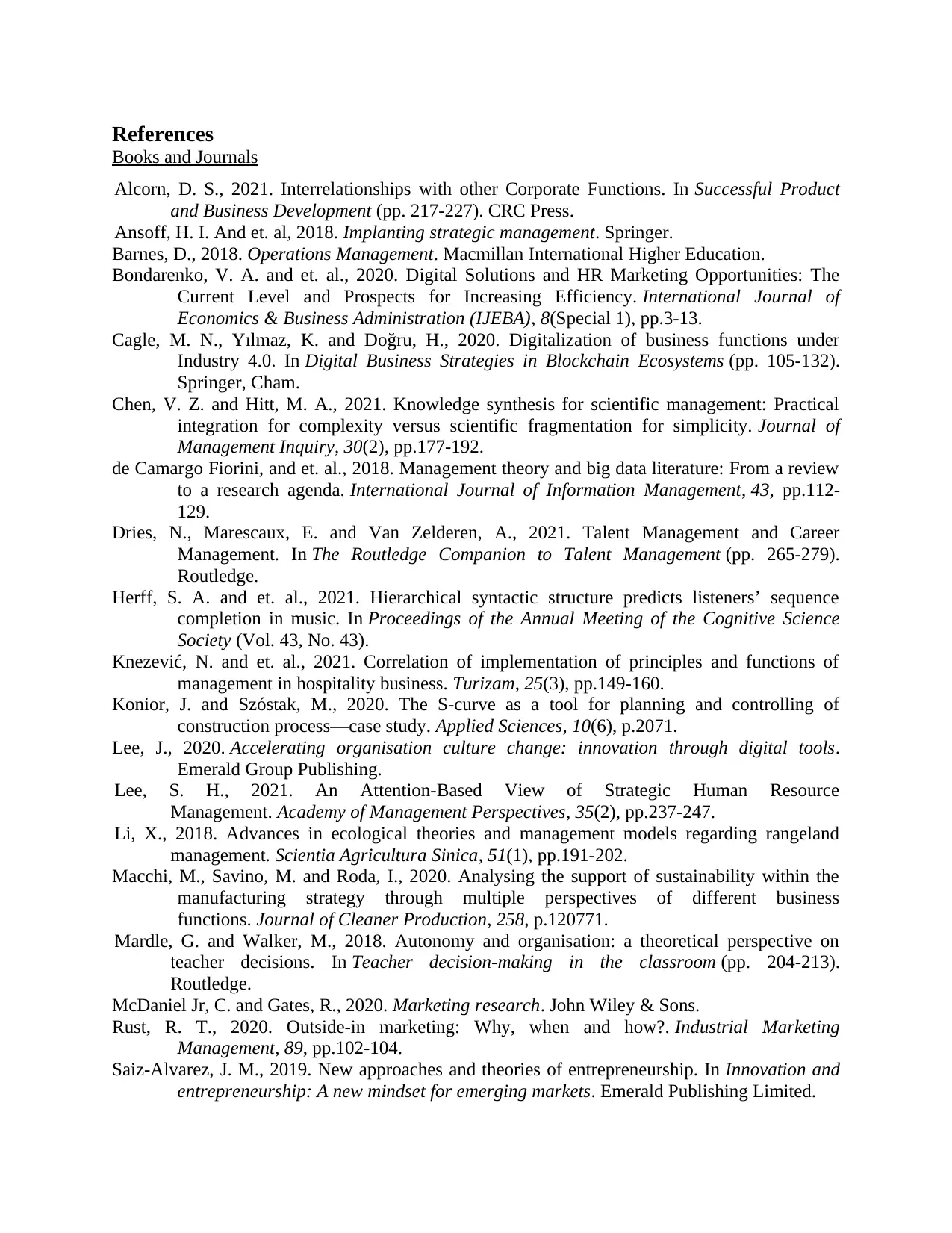
References
Books and Journals
Alcorn, D. S., 2021. Interrelationships with other Corporate Functions. In Successful Product
and Business Development (pp. 217-227). CRC Press.
Ansoff, H. I. And et. al, 2018. Implanting strategic management. Springer.
Barnes, D., 2018. Operations Management. Macmillan International Higher Education.
Bondarenko, V. A. and et. al., 2020. Digital Solutions and HR Marketing Opportunities: The
Current Level and Prospects for Increasing Efficiency. International Journal of
Economics & Business Administration (IJEBA), 8(Special 1), pp.3-13.
Cagle, M. N., Yılmaz, K. and Doğru, H., 2020. Digitalization of business functions under
Industry 4.0. In Digital Business Strategies in Blockchain Ecosystems (pp. 105-132).
Springer, Cham.
Chen, V. Z. and Hitt, M. A., 2021. Knowledge synthesis for scientific management: Practical
integration for complexity versus scientific fragmentation for simplicity. Journal of
Management Inquiry, 30(2), pp.177-192.
de Camargo Fiorini, and et. al., 2018. Management theory and big data literature: From a review
to a research agenda. International Journal of Information Management, 43, pp.112-
129.
Dries, N., Marescaux, E. and Van Zelderen, A., 2021. Talent Management and Career
Management. In The Routledge Companion to Talent Management (pp. 265-279).
Routledge.
Herff, S. A. and et. al., 2021. Hierarchical syntactic structure predicts listeners’ sequence
completion in music. In Proceedings of the Annual Meeting of the Cognitive Science
Society (Vol. 43, No. 43).
Knezević, N. and et. al., 2021. Correlation of implementation of principles and functions of
management in hospitality business. Turizam, 25(3), pp.149-160.
Konior, J. and Szóstak, M., 2020. The S-curve as a tool for planning and controlling of
construction process—case study. Applied Sciences, 10(6), p.2071.
Lee, J., 2020. Accelerating organisation culture change: innovation through digital tools.
Emerald Group Publishing.
Lee, S. H., 2021. An Attention-Based View of Strategic Human Resource
Management. Academy of Management Perspectives, 35(2), pp.237-247.
Li, X., 2018. Advances in ecological theories and management models regarding rangeland
management. Scientia Agricultura Sinica, 51(1), pp.191-202.
Macchi, M., Savino, M. and Roda, I., 2020. Analysing the support of sustainability within the
manufacturing strategy through multiple perspectives of different business
functions. Journal of Cleaner Production, 258, p.120771.
Mardle, G. and Walker, M., 2018. Autonomy and organisation: a theoretical perspective on
teacher decisions. In Teacher decision-making in the classroom (pp. 204-213).
Routledge.
McDaniel Jr, C. and Gates, R., 2020. Marketing research. John Wiley & Sons.
Rust, R. T., 2020. Outside-in marketing: Why, when and how?. Industrial Marketing
Management, 89, pp.102-104.
Saiz-Alvarez, J. M., 2019. New approaches and theories of entrepreneurship. In Innovation and
entrepreneurship: A new mindset for emerging markets. Emerald Publishing Limited.
Books and Journals
Alcorn, D. S., 2021. Interrelationships with other Corporate Functions. In Successful Product
and Business Development (pp. 217-227). CRC Press.
Ansoff, H. I. And et. al, 2018. Implanting strategic management. Springer.
Barnes, D., 2018. Operations Management. Macmillan International Higher Education.
Bondarenko, V. A. and et. al., 2020. Digital Solutions and HR Marketing Opportunities: The
Current Level and Prospects for Increasing Efficiency. International Journal of
Economics & Business Administration (IJEBA), 8(Special 1), pp.3-13.
Cagle, M. N., Yılmaz, K. and Doğru, H., 2020. Digitalization of business functions under
Industry 4.0. In Digital Business Strategies in Blockchain Ecosystems (pp. 105-132).
Springer, Cham.
Chen, V. Z. and Hitt, M. A., 2021. Knowledge synthesis for scientific management: Practical
integration for complexity versus scientific fragmentation for simplicity. Journal of
Management Inquiry, 30(2), pp.177-192.
de Camargo Fiorini, and et. al., 2018. Management theory and big data literature: From a review
to a research agenda. International Journal of Information Management, 43, pp.112-
129.
Dries, N., Marescaux, E. and Van Zelderen, A., 2021. Talent Management and Career
Management. In The Routledge Companion to Talent Management (pp. 265-279).
Routledge.
Herff, S. A. and et. al., 2021. Hierarchical syntactic structure predicts listeners’ sequence
completion in music. In Proceedings of the Annual Meeting of the Cognitive Science
Society (Vol. 43, No. 43).
Knezević, N. and et. al., 2021. Correlation of implementation of principles and functions of
management in hospitality business. Turizam, 25(3), pp.149-160.
Konior, J. and Szóstak, M., 2020. The S-curve as a tool for planning and controlling of
construction process—case study. Applied Sciences, 10(6), p.2071.
Lee, J., 2020. Accelerating organisation culture change: innovation through digital tools.
Emerald Group Publishing.
Lee, S. H., 2021. An Attention-Based View of Strategic Human Resource
Management. Academy of Management Perspectives, 35(2), pp.237-247.
Li, X., 2018. Advances in ecological theories and management models regarding rangeland
management. Scientia Agricultura Sinica, 51(1), pp.191-202.
Macchi, M., Savino, M. and Roda, I., 2020. Analysing the support of sustainability within the
manufacturing strategy through multiple perspectives of different business
functions. Journal of Cleaner Production, 258, p.120771.
Mardle, G. and Walker, M., 2018. Autonomy and organisation: a theoretical perspective on
teacher decisions. In Teacher decision-making in the classroom (pp. 204-213).
Routledge.
McDaniel Jr, C. and Gates, R., 2020. Marketing research. John Wiley & Sons.
Rust, R. T., 2020. Outside-in marketing: Why, when and how?. Industrial Marketing
Management, 89, pp.102-104.
Saiz-Alvarez, J. M., 2019. New approaches and theories of entrepreneurship. In Innovation and
entrepreneurship: A new mindset for emerging markets. Emerald Publishing Limited.
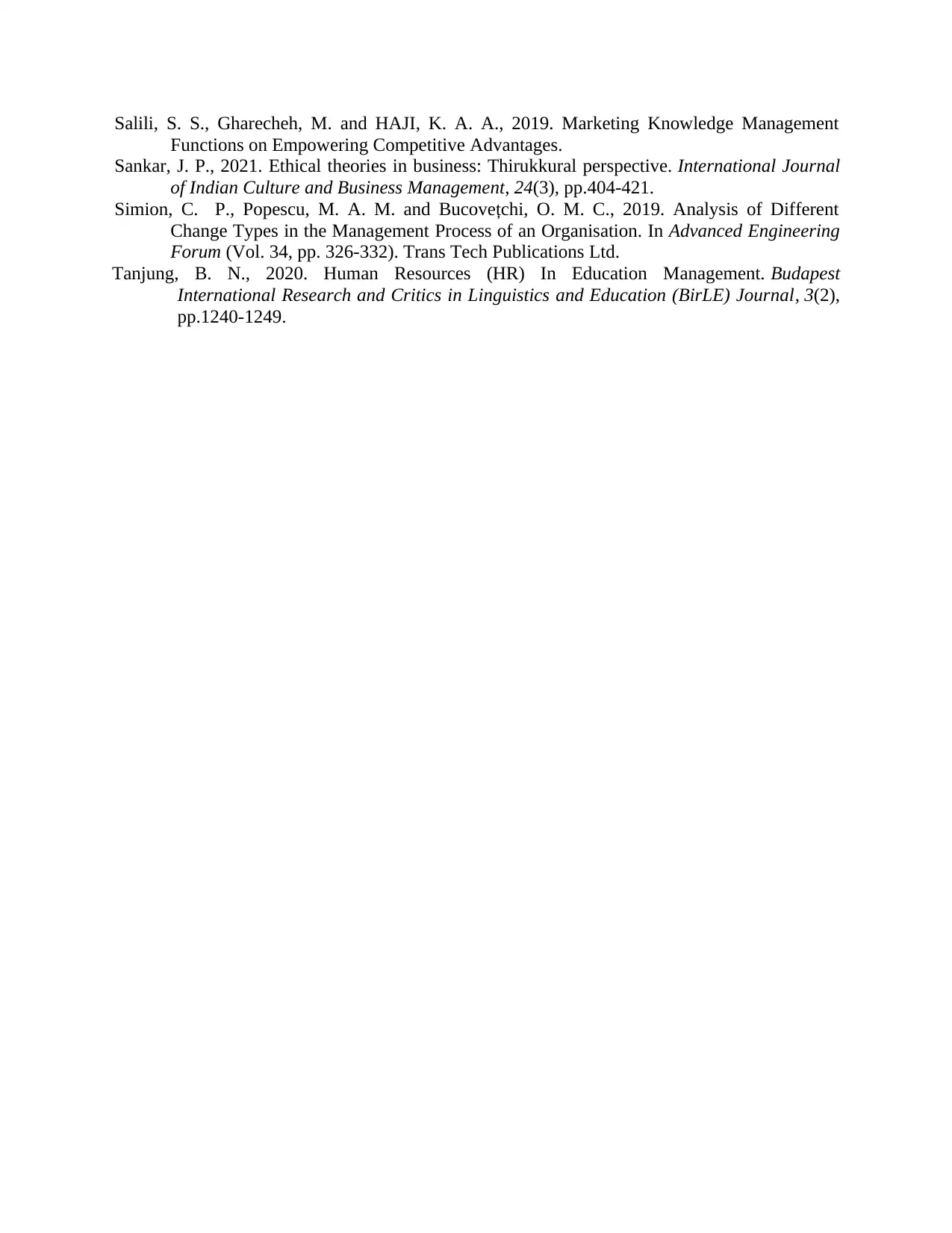
Salili, S. S., Gharecheh, M. and HAJI, K. A. A., 2019. Marketing Knowledge Management
Functions on Empowering Competitive Advantages.
Sankar, J. P., 2021. Ethical theories in business: Thirukkural perspective. International Journal
of Indian Culture and Business Management, 24(3), pp.404-421.
Simion, C. P., Popescu, M. A. M. and Bucovețchi, O. M. C., 2019. Analysis of Different
Change Types in the Management Process of an Organisation. In Advanced Engineering
Forum (Vol. 34, pp. 326-332). Trans Tech Publications Ltd.
Tanjung, B. N., 2020. Human Resources (HR) In Education Management. Budapest
International Research and Critics in Linguistics and Education (BirLE) Journal, 3(2),
pp.1240-1249.
Functions on Empowering Competitive Advantages.
Sankar, J. P., 2021. Ethical theories in business: Thirukkural perspective. International Journal
of Indian Culture and Business Management, 24(3), pp.404-421.
Simion, C. P., Popescu, M. A. M. and Bucovețchi, O. M. C., 2019. Analysis of Different
Change Types in the Management Process of an Organisation. In Advanced Engineering
Forum (Vol. 34, pp. 326-332). Trans Tech Publications Ltd.
Tanjung, B. N., 2020. Human Resources (HR) In Education Management. Budapest
International Research and Critics in Linguistics and Education (BirLE) Journal, 3(2),
pp.1240-1249.
1 out of 10
Related Documents
Your All-in-One AI-Powered Toolkit for Academic Success.
+13062052269
info@desklib.com
Available 24*7 on WhatsApp / Email
![[object Object]](/_next/static/media/star-bottom.7253800d.svg)
Unlock your academic potential
© 2024 | Zucol Services PVT LTD | All rights reserved.




